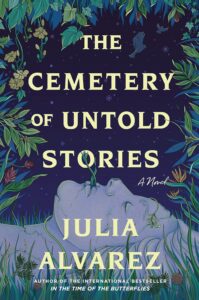This first appeared in Lit Hub’s Craft of Writing newsletter—sign up here.
On a Sunday in October, 2021, well into a second year of the pandemic, in the incipient stages of a new novel, I woke up to a total retinal detachment in my right eye. I describe the experience as palm branches tumbling down inside my eye. I recall being curious—so what happens now?—before terror swept in as a black curtain fell over my eye. My vision went black. Luckily, my husband, a retired ophthalmologist, knew what was happening and contacted a retinologist colleague who examined me and confirmed I had suffered a total retinal detachment. Two painful surgeries ensued, neither successful. I was not going to recover sight in that eye. To top it off, the remaining “good eye” was seeing double. Would I ever be able to see enough to read and write again?
I went into a dark place.
Then, grace! A medical acquaintance hearing how shaken I was gave me words that became string in my labyrinth: “Your eye won’t get better, Julia, but you will.”
The first time I was allowed to sit up—not face down in a contraption to allow the gas bubble in my eye to hold the reattached retina in place, I headed for my meditation cushion. Now that the shock and pain had faded I braced myself for the worry-furies I was sure would plague me. Imagine my surprise when what came up was a sense of great relief. Something was being lifted from my shoulders—all those years of being the little racehorse, driving myself to write the next and the next book, to put myself out there, to help out fellow writers with blurbs and intros, to continue to be a viable writer—what did they matter now?
Instead, I would have to learn “how to be idle and blessed,” and like Mary Oliver in her poem, “The Summer Day,” ask myself, “What is it you plan to do / with your one wild and precious life?”
Incorrigibly, what I wanted to do was write one last book. Just one, I bargained.
With the help of prism glasses that helped reduce the doubling vision, I dusted off the novel I had started prior to the retinal collapse and surgeries. I had gotten stuck as to where to take this story of an older writer, a Prospero in Latina female guise, who has come to the end of her rough magic and knows it is time to bury her unfinished manuscripts.
As with clogged arteries, sometimes we seasoned writers have to clean out the debris of careerism, the knowledge of all we’ve written, read, accomplished, so that the force can drive the green fuse through the flower. Fall in love with writing again.
Why had I taken up this story prior to its becoming my story? As a writer in her seventies, I know curtain time is soon to come. Beginning with Mami’s taunt when I was “only” in my late fifties, “And what are you going to do when you get too old to write, ha?’” and later with friends wondering, “So when are you going to retire?” my answer had always been King Lear’s “Never, never, never, never, never!” But my protagonist, a writer, discovers that sometimes there is an end. She has run out of animo; her two last attempts at novels join other boxes of unfinished stories and aborted characters. But she can’t bear to abandon them all to the silence. So she decides to go back to her homeland, where many of her stories came from, and bury these rough drafts in a piece of inherited property.
The Cemetery of Untold Stories now had that juice of necessity and passion that had been missing before.
Every day I sat down to write was a gift I hadn’t expected. Every character was endlessly fascinating, every image I could captivate, every sentence I could manage was a petite miracle. I couldn’t drive myself like before, working six, seven hours, and then putting in a few more hours on book biz. Now, if I only got an hour—the eye strain told me when I’d had enough—I was grateful and longing to reenter the work again. I was back where I had started as a young writer, in the play and delight of the writing itself. Not without its accompanying frustrations and self-doubts (I was still me, after all) but it was a rebirth. “And now in age, I bud again. / After so many deaths, I live and write,” writes the poet George Herbert. Resets are necessary throughout a writing life, but especially after a lifetime spent in a craft when one can become jaded and wearied and stale.
You don’t have to lose your vision or a spouse or be stricken with a terrifying disease. But as with clogged arteries, sometimes we seasoned writers have to clean out the debris of careerism, the knowledge of all we’ve written, read, accomplished, so that the force can drive the green fuse through the flower. Fall in love with writing again. As a character in the draft of a new novel I’ve started says about growing old, “Finally, finally, you fall in love with your life, just when you have to let it go.”
Oh yes, I am at work on another novel. Like your one-and-only-true-love who keeps showing up after the last one-and-only breaks your heart. It is slow going and frustrating as I learn to work with a handicap and negotiate a new writing world, but then, shouldn’t the writing of every book be like this? An attentive, loving, endlessly patient attitude. “Grant me the intelligence and the patience to find the true pattern,” the Mayan weavers pray at their looms as they sit down to work. And if I don’t finish this next “final” novel, there is now a cemetery for untold stories where it will find a home.
___________________________________

The Cemetery of Untold Stories by Julia Alvarez is available now via Algonquin Books.

